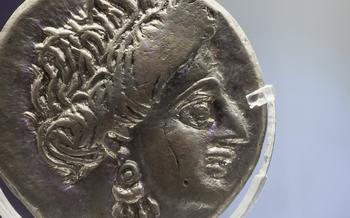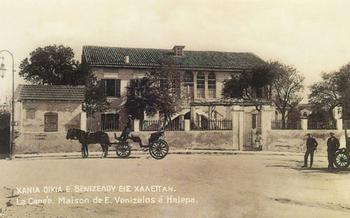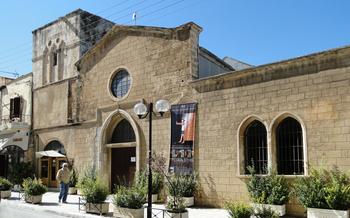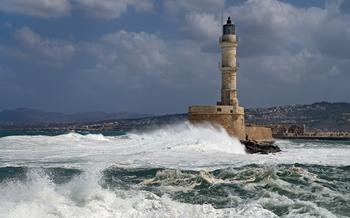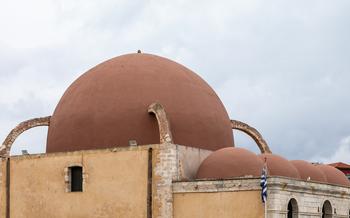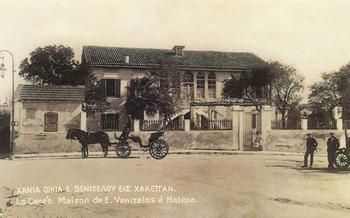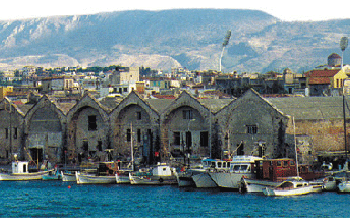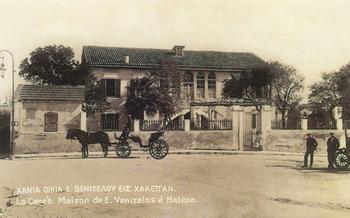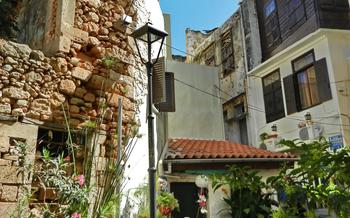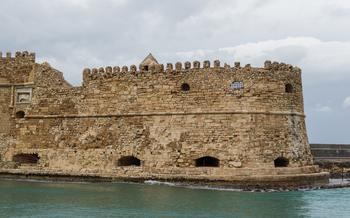
Museum of the Greek National Football Team
- A trip back in time: The history of the Greek national football team
- Behind the Scenes: A Glimpse into the Players' Lives
- Legendary Coaches: The Masterminds Behind the Team's Success
- Footballing heroes: The faces that graced the pitch
- The Stadium: Where Dreams Come to Life
- The evolution of tactics: From traditional to modern football
- The museum: An immersive journey through football history
- Witnessing the Passion: The Fans' Perspective
- Future aspirations: The road ahead for Greek football
- The museum experience: A step-by-step guide
- Transportation tips: Getting to the museum with ease
- Combining history with leisure: Exploring Chania
- A taste of Crete: Local cuisine and culinary delights
- Insider tip: Unveiling hidden treasures
A trip back in time: The history of the Greek national football team
The Greek national football team, affectionately known as "Ethniki Omada," has a rich history dating back to the early 20th century. Formed in 1929, the team made its international debut in 1931 against Italy. Despite a rocky start, the team gradually gained recognition and achieved several notable milestones over the years.
One of the team's most significant achievements came in 2004 when they stunned the world by winning the European Championship in Portugal. This historic victory marked a turning point for Greek football, propelling the team to new heights and inspiring a generation of young players.
Throughout its history, the Greek national team has produced many unforgettable moments, victories, and interesting anecdotes. From the team's first international win against Yugoslavia in 1933 to their heroic performance at the 2014 World Cup in Brazil, the Ethniki Omada has etched its name into the annals of football history.
Behind the Scenes: A Glimpse into the Players' Lives
The Greek national football team is not just about individual talent; it is about the collective spirit and camaraderie that binds the players together. The team's success on the field can be attributed in part to the strong bonds formed between teammates, both on and off the pitch.
These players come from diverse backgrounds and upbringings, but they share a common goal: to represent their country with pride and achieve success on the international stage. They spend countless hours training together, pushing each other to improve and supporting each other through victories and defeats.
Their daily routine is rigorous and demanding. They adhere to strict training schedules, which include intense physical workouts, tactical drills, and strategy sessions. Nutrition also plays a crucial role in maintaining their peak physical condition, and they follow carefully designed meal plans to ensure they receive the necessary nutrients for optimal performance.
Beyond their professional commitments, the players also share a genuine camaraderie off the field. They spend time together socializing, relaxing, and engaging in team-building activities that further strengthen their bond. This sense of unity and friendship is essential for creating a harmonious environment within the team, where players can rely on and trust each other implicitly.
It is this unwavering support and camaraderie that has helped the Greek national football team overcome challenges, achieve success, and create unforgettable moments in the history of Greek football.
Legendary Coaches: The Masterminds Behind the Team's Success
Throughout its history, the Greek National Football Team has been guided by a series of remarkable coaches who have played a crucial role in shaping the team's identity and achievements. These legendary figures have brought their unique philosophies, strategies, and leadership to the team, leaving an indelible mark on its development.
One of the most influential figures in the team's history is Otto Rehhagel, the German coach who led Greece to their historic triumph at the 2004 European Championship. Rehhagel is renowned for his tactical acumen, his ability to motivate and unite the team, and his unwavering belief in his players' abilities. Under his guidance, Greece defied all expectations and shocked the football world by claiming the European title, etching their name into the annals of football history.
Another notable coach is Fernando Santos, who took over the reins of the team following Rehhagel's departure. Santos continued the team's success, leading them to the Round of 16 at the 2012 European Championship and the Round of 16 at the 2014 FIFA World Cup. Santos' legacy lies in his ability to maintain the team's competitive spirit and tactical discipline, ensuring that Greece remained a force to be reckoned with on the international stage.
These are just a few examples of the legendary coaches who have guided the Greek National Football Team throughout its history. Their contributions have been invaluable, shaping the team's identity, instilling a winning mentality, and leading them to unprecedented success on the international stage.
Footballing heroes: The faces that graced the pitch
The Greek National Football Team has been blessed with a plethora of talented players throughout its history, each contributing to the team's success and etching their names in the annals of Greek football. One of the most iconic figures is Theodoros Zagorakis, the captain of the 2004 European Championship-winning team. Zagorakis was a tireless midfielder known for his leadership, tactical intelligence, and ability to control the tempo of the game.
Another legendary player is Angelos Charisteas, who scored the winning goal in the Euro 2004 final against Portugal. Charisteas was a powerful striker with an uncanny ability to find the back of the net in crucial moments.
Giorgos Karagounis is another notable name, having earned over 130 caps for Greece. Karagounis was a versatile midfielder who could play in a variety of positions and was known for his tenacity, skill, and leadership on the pitch.
Vasilis Torosidis is a more recent star, having represented Greece at two World Cups and three European Championships. Torosidis was a versatile defender who could play on either flank and was known for his speed, strength, and crossing ability.
These are just a few examples of the many talented players who have represented Greece on the international stage. Their contributions to the team's success have left an indelible mark on Greek football history and continue to inspire future generations of players.
The Stadium: Where Dreams Come to Life
The Greek national football team plays its home matches at the Georgios Kamaras Stadium in Athens, also known as the Nea Smyrni Stadium. Built in 1939, this historic stadium has witnessed some of the most iconic moments in Greek football history. With a capacity of over 14,000 seats, the stadium is known for its passionate and electric atmosphere, created by the devoted fans who cheer on their team.
The stadium has undergone several renovations over the years to meet modern standards and accommodate the growing number of fans. In 2004, it received a major upgrade in preparation for the Olympic Games, including the installation of new seats, a modern sound system, and improved facilities.
The stadium has hosted numerous memorable matches, including Greece's historic victory over Portugal in the final of the 2004 European Championship. The match, which ended in a 1-0 victory for Greece, was a defining moment for the team and the country, and the stadium erupted in jubilation as the final whistle blew.
The Georgios Kamaras Stadium remains a symbol of Greek football, and it continues to be a focal point for the national team's success. The stadium's rich history and passionate atmosphere make it a must-visit for any football enthusiast visiting Greece.
The evolution of tactics: From traditional to modern football
The Greek National Football Team has undergone significant tactical changes throughout its history, reflecting the evolving nature of the game and the team's desire to remain competitive at the highest level. In the early years, the team employed a more traditional approach, emphasizing physicality, defensive solidity, and reliance on individual skill.
As the team progressed and gained experience, it adopted a more possession-based style of play, prioritizing ball control, short passing, and creating scoring opportunities through intricate combinations. This shift in tactics allowed the team to control the tempo of matches, dictate the terms of engagement, and maximize its technical abilities.
In recent years, the team has embraced a more versatile approach, adapting its tactics to suit different opponents and match situations. This flexibility has enabled the team to remain competitive against stronger opponents and achieve success in various competitions.
Several factors have contributed to these tactical shifts, including changes in player profiles, the influence of global football trends, and the appointment of coaches with different tactical philosophies. The team's willingness to adapt and evolve has been instrumental in its continued success and ability to compete at the highest level of international football.
The museum: An immersive journey through football history
The Museum of the Greek National Football Team is a haven for football enthusiasts, offering an immersive journey through the team's rich history and achievements. The museum showcases a treasure trove of artifacts, memorabilia, and interactive exhibits that bring to life the stories of legendary players, iconic matches, and unforgettable triumphs.
Visitors can trace the team's roots, from its humble beginnings to its rise as European champions, through a captivating display of historical photographs, match programs, and team jerseys. The museum also features interactive touchscreens and multimedia presentations that allow visitors to relive key moments in the team's history, including their triumphant victory at Euro 200
A highlight of the museum is the Hall of Fame, which honors the legendary players who have graced the pitch for Greece. Here, visitors can learn about the extraordinary careers of these footballing icons, their contributions to the team's success, and the impact they have had on the game.
The museum's immersive experience extends beyond the exhibits, with a dedicated section that allows visitors to step into the shoes of a professional football player. Interactive challenges test visitors' skills in passing, shooting, and goalkeeping, providing a glimpse into the talent and dedication required to compete at the highest level.
A visit to the Museum of the Greek National Football Team is a must for any football fan. It's a place where history comes alive, where legends are celebrated, and where the passion for the beautiful game is ignited.
Witnessing the Passion: The Fans' Perspective
The Greek national football team boasts a passionate and dedicated fan base that plays a vital role in the team's success. The fans create an electric atmosphere at matches, both home and away, with their unwavering support and enthusiasm. They are renowned for their colorful displays, chants, and unwavering belief in the team, even during challenging times.
Stories abound of loyal supporters who have traveled far and wide to cheer on their beloved team. Some fans have even made sacrifices, such as taking time off from work or spending their savings, to follow the team to international tournaments. Their dedication and love for the game are truly inspiring.
One memorable story involves a group of fans who traveled to Portugal for the 2004 European Championship. Despite facing financial difficulties, they pooled their resources and managed to secure tickets for the tournament. Their unwavering support and belief in the team were rewarded when Greece emerged victorious, creating a memory that they will cherish forever.
The fans' passion extends beyond the stadium. They actively engage with the team through social media, fan clubs, and community initiatives. Their unwavering support and enthusiasm have played a significant role in shaping the identity and legacy of the Greek national football team.
Future aspirations: The road ahead for Greek football
The Greek National Football Team has its sights set firmly on the future, with the ambition to build upon their past successes and achieve even greater heights. The team is committed to developing young talent, nurturing the next generation of players who will represent Greece on the international stage.
A key focus for the team is to establish a strong youth development system, identifying and training promising young players from a young age. This will ensure a steady pipeline of talented players who can step up to the national team in the years to come. The team is also working to improve its scouting network, both domestically and internationally, to uncover hidden gems who can make a positive contribution to the team.
In terms of upcoming tournaments and competitions, the Greek National Football Team has set ambitious goals for themselves. The team is determined to qualify for and make a significant impact in major international tournaments, such as the FIFA World Cup and the UEFA European Championship. The team is also looking to build on their success in regional competitions, such as the UEFA Nations League, and establish themselves as a force to be reckoned with on the international stage.
To achieve these goals, the team is committed to continuous improvement and adaptation. The coaching staff is constantly analyzing their performance, identifying areas for growth, and implementing new strategies and tactics to stay ahead of the competition. The players are also dedicated to improving their individual skills and fitness levels, working hard in training and maintaining a healthy lifestyle.
With the unwavering support of their passionate fans, the Greek National Football Team is confident that they can overcome any challenges and achieve their aspirations for the future. The team is united in their determination to make Greece proud and to leave a lasting legacy in the world of football.
The museum experience: A step-by-step guide
Planning your visit to the Museum of the Greek National Football Team is essential to ensure a smooth and enjoyable experience. Here's a step-by-step guide to help you make the most of your trip:
Check the opening hours: Before your visit, check the museum's website or contact them directly to confirm their operating hours. Opening hours may vary depending on the season or special events.
Book your tickets in advance: To avoid queues and ensure your entry, consider booking your tickets online in advance. Online booking platforms often offer discounted rates and allow you to choose a specific time slot for your visit.
Consider a guided tour: Guided tours are an excellent way to delve deeper into the museum's exhibits and learn more about the history of the Greek National Football Team. Tours are typically led by knowledgeable guides who can provide insights and anecdotes that enhance the experience.
Allocate enough time: The museum houses a vast collection of artifacts and displays, so it's advisable to allocate at least two hours for your visit. This will give you ample time to explore the exhibits at your own pace and absorb the information presented.
Capture the moments: Don't forget your camera or smartphone to capture memorable moments during your visit. The museum allows photography, so you can take pictures of the exhibits, interactive displays, and any special events or exhibitions that may be taking place.
Engage with the interactive exhibits: The museum features several interactive exhibits that allow visitors to engage with the history of the Greek National Football Team in a fun and immersive way. Take advantage of these interactive displays to learn more about the players, matches, and achievements of the team.
Shop for souvenirs: The museum shop offers a range of souvenirs and memorabilia related to the Greek National Football Team. You can purchase items such as jerseys, scarves, caps, and other merchandise to commemorate your visit and support the team.
Transportation tips: Getting to the museum with ease
The Museum of the Greek National Football Team is conveniently accessible using public transportation. The museum is located near several bus stops, making it easy for visitors to reach from different parts of Chania. Bus routes 10, 11, and 13 all have stops within a short walking distance of the museum. Visitors can use the Chania Bus website or app to plan their journey and find the most convenient bus route.
For those traveling by car, there is ample parking available near the museum. There is a designated parking area for visitors to the museum, located just a short walk away. Parking fees apply, and visitors can pay using coin-operated meters or through a mobile app. The museum's website provides detailed information about parking options and fees.
Combining history with leisure: Exploring Chania
Chania, the captivating city that houses the Museum of the Greek National Football Team, is a treasure trove of historical and cultural wonders waiting to be explored. Beyond the museum's walls lies a kaleidoscope of experiences that will enthrall history buffs, culture seekers, and leisure enthusiasts alike.
Immerse yourself in the charm of the Venetian Harbor, a picturesque waterfront lined with pastel-colored buildings, inviting tavernas, and bobbing fishing boats. Stroll along the narrow cobblestone streets of the Old Town, where history whispers from every corner. Discover hidden churches, elegant mansions, and remnants of ancient civilizations that have shaped Chania's rich tapestry.
Delve into the depths of history at the Archaeological Museum, home to an impressive collection of artifacts that chronicle Crete's fascinating past, from the Minoan era to the Roman Empire. Explore the Venetian fortifications that once protected the city, including the imposing Koules Fortress, a symbol of Chania's resilience.
As the sun begins to set, indulge in the vibrant culinary scene that Chania offers. Savor the flavors of traditional Cretan cuisine, a delightful blend of fresh seafood, succulent meats, and aromatic herbs. Enjoy a leisurely dinner at a waterfront taverna, where the gentle sea breeze mingles with the tantalizing aromas of grilled octopus, freshly caught fish, and homemade Cretan wine.
A taste of Crete: Local cuisine and culinary delights
A trip to Chania is not complete without savoring the delectable flavors of Cretan cuisine. The island's rich culinary heritage blends traditional Greek dishes with unique local ingredients, creating a symphony of tastes that will tantalize your palate.
Indulge in the simplicity yet exquisite flavors of "dakos," a traditional Cretan salad made with barley rusks topped with tomatoes, feta cheese, and a drizzle of olive oil. Another must-try is "gamopilafo," a hearty wedding pilaf made with rice, lamb, and aromatic spices. For seafood lovers, "bourboulisto" is a delicious dish of stewed snails cooked in a flavorful tomato sauce.
Chania is also renowned for its exceptional olive oil, produced from the island's olive groves. Drizzle some of this golden liquid over your meals to enhance their flavors. Don't forget to sample the local cheeses, such as "graviera" and "mizithra," which are made from sheep's or goat's milk.
To fully immerse yourself in the Cretan culinary experience, visit the bustling local markets, where you can find fresh produce, herbs, spices, and traditional Cretan products. Engage with the friendly locals, who will be more than happy to share their culinary secrets and recommend hidden gems.
Whether you prefer fine dining in a traditional taverna or a casual meal at a local eatery, Chania has something to offer every palate. So, embark on a culinary adventure and let the flavors of Crete dance on your taste buds.
Insider tip: Unveiling hidden treasures
Beyond the museum and the famous attractions of Chania, there lies an enchanting hidden gem waiting to be discovered. Just a short walk from the museum, tucked away in a charming alleyway, lies a small café named "To Steki tou Filathla" (The Athlete's Corner). This unassuming establishment is a haven for football enthusiasts, adorned with vintage football memorabilia and autographed jerseys from legendary Greek players. Savor the aromatic Greek coffee while engaging in lively conversations with locals about the team's past glories and future aspirations. "To Steki tou Filathla" offers a unique glimpse into the passion and camaraderie that define Greek football culture, making it a must-visit for any true fan.
